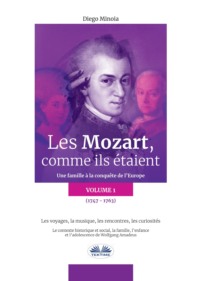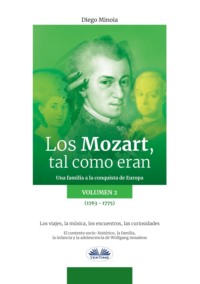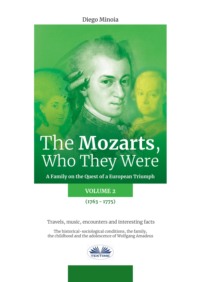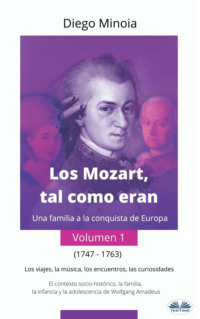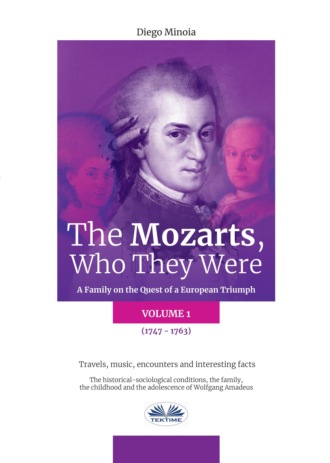
Полная версия
The Mozarts, Who They Were (Volume 1)
Leopold, nevertheless, did not remain mentally closed within the limited confines of the provincial Salzburg. Besides his contacts in his native Augsburg, he cultivated epistolary relations with German musicians and music lovers from Leipzig (Lorenz Mizler) and Berlin (Friedrich Marpurg), as well as with various publishers such as Hulrich Haffner from Nuremburg (who, at his own expense, he had commissioned to print his first published opera, the Six Sonatas Trio dedicated to Count Thurn, and had also published three of his Sonatas for the harpsichord in Italian style) and Gottlieb Immanuel Breitkopf from Leipzig (who inserted numerous compositions of Leopold into his catalogue).
After the birth of Wolfgang, it was true that he dedicated a lot of time to the formation of his prodigious children and the rest of his time to his work related commitments, but he still continued for a long period to compose. He gave up only when he realized, irremediably, that his compositions were outdated and behind the times. And certainly, the production in continual evolution of his son did not contribute to improving his appreciation of his own past work. The fact was, in any case, that Leopold's musical "style" influenced his son, combined with the many other ideas that the young man encountered over time, adopted from other artists and then finally, he came into his own, transforming every note written by him into sublime Mozartian perfection.
The teacher
As a teacher, it is necessary to acknowledge Leopold Mozart's reliable ability which was first acquired in his role as a singing and instrument teacher to children at the Princely Chapel and later, refined in the elaboration of his book, "Violinschule" (A Treaty on the Fundamental Principles of Violin Playing) which was published for the first time in 1756 (the year of Wolfgang's birth) and reprinted in 1769 and again in 1787 (the year of its author's death). The method, published at Leopold's expense by the publisher, Johann Jakob Lotter of Augsburg, had already been widely distributed throughout Europe and was translated into Dutch (1766) and French (1770), as Leopold proudly wrote in his epistolary years later.
Other various editions had been re-proposed over successive historical periods, right up to the present, as its structural and methodological coherence was, and remains, very useful to understanding the execution and expressive techniques of that epoch. The method, in fact, covers every aspect of execution techniques from that era of the transition from Baroque to Classicism and is simple, clear and complete, with relative examples of the positions, use of the bow, phrasing, interpretations of the grace notes, etc. Moreover, as complement to the book and in pointing out the author's desire to be thorough, it has a concise synthesis of the history of music and a basic dissertation on the rules of solfège.
The author's intention was that "Violinschule" was to be utilized by violin teachers and to those students who, while gifted, did not have the economic means to pay for private lessons; hence, the coherence of the method, its clear and concise language and the explicated examples of all the aspects of importance, not only for a correct execution of the music, but also for a precise expressive and communicative interpretation of the music that was to be carried out. The project of realizing a method for the violin gave us a Leopold Mozart who, at thirty-six years old, was well aware of the world of music of his time and of the new demands that were being proposed. His epistolary contacts with musicians and German musical critics were testimony that his ambition went beyond his career that was leading him to the Salzburg Court.
Even before Wolfgang's birth, later driving him to dedicate all of his efforts toward his son's achievements, his ambition was to leave a long lasting mark in the world of music, but it is significant that he chose to do this through the means of an instructional method. This tells us that he was aware of his organizational and methodology abilities, while possibly emphasizing that he did not have particular ambitions to go down in history as a composer (admitting, at least to himself, to not being gifted enough to compete not only with the Italian composers, but with his local competitors for the title of Kapellmeister of the Court).
In any case, the choice to write a method for the violin was consistent with the times and gave results to a well thought out plan, given that in that epoch, the choice for available aspiring musicians was not what it is today. In the radius surrounding Germany, there were two principle methods for learning an instrument: that of Johann Joachim Quantz for the flute, with some mention of the violin (1752), and that of Carl Philipp Emanuel Bach for keyboard instruments (1753). As we can see, there was not an abundance of opportunity and, at least in the Germanic area, there was no specific method for the violin.
In England, a few years previous (1748 -- 1751), there was the Italian composer and violinist Francesco Saverio Geminiani (Lucca 1687 -- Dublin 1762) who had published three books on learning the violin. And previous to that, Giuseppe Tartini (Piran 1692 -- Padua 1770), celebrated violinist and composer, as well as a talented acoustics theorist and scholar (well-known for his "Devil's Trill Sonata" and for the theorization of the famous "combination tone" - additional tone or tones that are artificially perceived when two real tones are sounded at the same time). The Italian teacher had written various works such as "A letter from the late Signor Tartini to Signora Maddalena Lombardini: published as an important lesson to performers on the violin", "Traité des agréments de la musique -- Treatise on ornaments in music" and the method "Lezioni pratiche del violino - Practical Lessons of the Violin".
Tartini's operas were well-known by Leopold Mozart and took it upon himself to "borrow" some of the important parts, even the above-mentioned examples in their entirety (but transposed in another key to camouflage the origin) without citing the name of the author and only occasionally mentioning "a famous Italian violinist". The Mozartian epistolary tells us that Leopold was always very scrupulous with every detail regarding the distribution of his method and for bringing in the best profits. Later, we will talk about the difficulties related to the technical and financial problems of publishing the method and how arduous it was to manage the distribution of the book with sellers and to receive payment for the sales (a job that, in his absence, was delegated to his wife under extremely precise instructions).
Here, we have an example of what he wrote to his wife on 7 January 1770 from Verona during his first journey to Italy with Wolfgang: "Has no letter from Mr. Lotter yet arrived (the publisher from Augsburg who printed billable copies of Violinschule -- A/N) regarding the punctual receipt of money?". And later in the same letter: "Has Mr. Breitkopft from Leipzig (another music publisher -- A/N) not yet written to say whether he has received the 100 books? Have the books been sent to Vienna and has Mr. Graeffer (a bookseller -- A/N) confirmed their arrival?". "...prepare 12 copies of Violinschule and send them to the bookseller Joseph Wolf in Innsbruck. You should attach a brief letter stating something like: 'These are 12 copies of Violinschule which my husband, from Verona, told me to send to you. You may sell them on commission at 2 florins and 14 Tyrolese kreutzers per copy, and pay my husband 1 florin and 45 kreutzers per copy sold'".
Leopold Mozart also proved to be an attentive teacher to both of his children, preparing first Maria Anna and later Wolfgang, with a Notebook containing a certain number of brief compositions for the keyboard chosen by artists from that epoch (nearly always omitting the name) and was put in ascending order of difficulty. The initial amazement, and the father and musician's pride who realized that such an extraordinary talent was being produced (a state of mind stimulated for Wolfgang but not felt in the past for the equally talented Nannerl) are highlighted in the writings added to the legacy of pieces that the boy had learned bit by bit. It is almost like reading a prophesy of information being left to future readers, giving proof of his son's precocious abilities: "Wolfgangerl (term of endearment) has learned in half an hour this four-handed minuet, at half past nine in the evening on 26 January 1761, the day before his birthday". With Wolfgang's early attempts at composing, the Notebook also became enriched with little minuets created and performed at the keyboard by the boy and transcribed by the father.
Naturally, when the two prodigious children's "promotional" travels began, they never missed an opportunity for learning from various perspectives: singing lessons from famous performers (such as those had by Wolfgang in London from the celebrated Giovanni Manzuoli), learning about composing at encounters with prominent musicians (from, again in London, Johann Christian Bach and many other composers they met on their Italian journey). Moreover, besides the confined world of music, a smattering of foreign language was acquired (some French, English, Italian -- necessary for the operas, some Latin -- useful for sacred music), but most importantly, a lot of music heard in the academies, in the concert halls and in the well patronized theaters. We can say: on a daily basis, by the Mozarts.
The father
It is beyond a shadow of a doubt that Leopold had a systematic and powerful influence over the entire life of his son, not only during his childhood, but well into his formative years (the period in which he had total "control" of Wolfgang's activities), continuing into the subsequent stages, specifically during their separation (his journeys to Munich and Paris and his move to Vienna), always with growing difficulty in making his son, who had grown unruly with his new born liberty, listen to him. The scholastic formation of Leopold Mozart was superior to the average citizen of that epoch which explains why he personally looked after his children's cultural education, as well as musical (particularly that of his son). In fact, there is no evidence that the Mozart children had ever attended any scholastic institutions, probably because once the father had realized that there were two talented children in the household, he decided to orient his own life and that of his offspring toward their development of child prodigies as soon as possible. To his credit, he did have the knowledge as father and musician, the duty to develop his children's' talent to the best of his ability, as he writes in a letter on 10 November 1766: "God who has been too generous with me, a miserable human being, and has given my children such talent that even if it were not my paternal duty, I would still be obliged to sacrifice everything for their best upbringing". In a later letter from 1777, he reiterates the concept "take advantage of talent: it is the Gospel itself that teaches us this". The child prodigies had to be nurtured before they aged, though, which would otherwise reduce the wonder and amazement that their talent would provoke from the public.
This is how Leopold expresses himself in a letter to his friend and publisher, Lotter from Augsburg in May of 1768: "...or maybe I should remain in Salzburg, awaiting with bated breath for a better chance, and watch Wolfgang grow (...) until Wolfgang reaches the age and development in which his merits would no longer be an object of wonder?"
The first journeys of the child prodigies had the double purpose of "earning revenue", especially Wolfgang, familiarizing him with Europe while simultaneously giving them the opportunity to grow and develop musically through encounters with influential composers, singers and instrumentalists. When they had outgrown their childhood, though, Leopold Mozart's focus changed. He needed to find an allocated position for Wolfgang at the Salzburg Court (his primary goal) with the hope of a subsequent position at the more prestigious courts.
Having a vision of the world, such as the acceptance of different roles in society's class and the necessity and convenience of ingratiating himself to anyone who might have a positive influence on their projects was also one of Leopold's deep and enduring influences; for the compliant Nannerl (who accepted the role of daughter and predestined wife, being married off by her father to an older man), as well as the favored Wolfgang. Leopold Mozart's habit of "being in the good graces" of every noble person who he encountered during his travels, surely assimilated by his son without the relational and scheming abilities of his father, was reiterated many times to an already grown Wolfgang in issued recommendations by letter.
In any case, if we expand our vision, we realize that almost all musicians of that epoch followed the same rules: ingratiating themselves to the powerful in order to obtain favors or career advancements. To give just one example of how diffused and widely practiced these rules were, we can cite Giovan Battista Sammartini (or San Martin, as was the correct written French version of the father's last name), who in building his career in Milan, always went to great pains to consort with and be praised by the families who had political, economic and social control in that epoch. Thanks to the aid of his noble supporters, and undoubtably to his abilities, he became the Musical Dominus of Milan for a few decades and was even nominated as Kapellmeister at the Royal Ducale of the Court, while simultaneously in the principle small town churches (an impressive 14 concurrently!). Now, let us return to Leopold and his recommendations.
Here are a few examples:
"If you go over the allotted time in your lessons with the younger students (reference is made to the Prince Palatine of Mannheim's natural children and to those of his mistress, A/N), then you have every chance of being praised by the Constituent Prince and it is certainly not necessary to tell you that you need to become close friends with the governess" (letter dated 8 December 1777).
"In Mannheim, you did very well to ingratiate yourself to Mr. Cannabich (Conductor of the Court", A/N) (letter dated 12 February 1778).
"It is very advantageous that you obtained the kindness of the Countess von Paumgarten (mistress of the Constituent Prince, A/N). Slowly but surely, you will no doubt, be paying visits to the Count Seinsheim (Minister of the Court of Mannheim, A/N) and to the wife of the President. (letter dated 20 November 1780).
Leopold was also generous toward his son related to compositional activities, with the intent of directing him toward the composition of pieces according to the requested style being commissioned, or at least according to what was fashionable in that epoch and in the various Courts. Always the pragmatist, Leopold knew the fickle European public, and desired that Wolfgang's music was to be the appropriate music, in the appropriate moment and for the appropriate public. Not being up to date could mean being condemned to oblivion (it was therefore, necessary to always be informed of any innovation in the field of music), but to be too modern could mean being condemned to incomprehension. Of these recommendations, most certainly lavished in abundance during the entire period of the formation and cohabitation with Wolfgang, we have a pretty good outline of the period in which Leopold was in Salzburg while his son was traveling: "While you are working, I suggest that you think not only of the musical public, but also the non-musical public; you know, for every ten true experts, there are always one-hundred ignorant people. Therefore, do not forget the so-called people of the masses who also invoke unrefined ears " (11 December 1780).
Composers also had to worry about keeping good relations with the musicians of the orchestra employed to execute their music, or suffer a punishment of superficial performances, if not downright boycotting. Here, we also have the experience of the father who comes to the rescue of his son, who we know (and a fact of which Leopold was well aware) was not exactly diplomatic in human relations. In a letter sent to Munich before the performance of the opera Idomeneo, Leopold wrote to his son: "Try to keep the entire orchestra in good humor, to praise them and keep them on your good side. (...) ...even the worst violinist is quite sensitive when you commend him face to face and will become enthusiastic and eager, and this kind of courtesy will not cost you more than just a few words. ...because you will need friendship and zeal from the entire orchestra when the opera will go on stage". (letter dated 25 December 1780). So, in the end, after an entire lifetime that he believed to have sacrificed for the success of his son (and we can acknowledge this to be true), Leopold is subjected to the disgrace, survived by him and of which he had never recovered, the multiple rebellions of his son: the discharge from his musical appointments in Salzburg, the choices made with his own free will during the course of his journey to Munich and Paris with his mother, the move to Vienna, his marriage to Constanze which was decided without his father's prearranged consent...
It is safe to say that there was plenty to make Leopold think that he had been let down by an ungrateful son, oblivious to the sacrifices made by a father for his child (let us not forget this father's wholly seventeenth century mentality). And in the letters during the years of their distance, which diminished over time as the communication between the Mozart father and son waned, Leopold never missed a chance to point this out to the rebellious Wolfgang: "...I have always thought that you should consider me more of a friend than father. You have ample proof of the fact that in my lifetime, I have looked after your fortune and your pleasure more than my own. I would have believed that you would have asked for my suggestions, seeing as I am a better judge of things and at finding the best way to proceed. (...) You will not abandon your father, will you?" (letter dated 20 July 1778). Wolfgang, on the other hand, in his letters responding to his father's recommendations, did everything possible to calm him, portraying himself as respectful of the teachings he received (then doing exactly as he pleased) and disguising his decisions with motives in order to gratify his father (who did not believe a word, knowing how to read between the lines). One example of this text and subtext we see in a letter from Wolfgang to his father, sent from Mannheim, after which his journey to Paris with the singer Aloysia Weber (of whom Wolfgang was infatuated), faded due to the latter's unavailability to entrust his fortune (and his heart) to the dreamer of Salzburg.
Later, in previous letters, having praised her musical and character traits, Aloysia and the hypothetic travel companions of the Parisian adventure, the flautist Wendling and the oboist Ramm, in a letter dated 4 February 1778, justify the relinquishment of the Parisian adventure due to the fact that one (Wendling) was without religion and the other (Ramm) was a philanderer. We shall see later, following the Mozartian epistolary, other examples that will assist us in better understanding the personalities of the Mozart family and the subtle relations between them in conjunction with important events.
Wolfgang
Johannes Chrisostomus Wolfgang Theophilus was born in Salzburg on 27 January 1756 at 8:00 p.m. and was baptized according to the Catholic rites on 28 January.
Physical appearance
He was of a small stature with a slight frame and a rather large head and his left ear was slightly deformed (wigs were the fashion in that epoch, which served to hide this defect). Wolfgang was certainly not blessed with a physique that the collective imagination would immediately define as a genius. Small, as we said, thin with fair skin and visible scars left from smallpox from which he was infected as a child. He had blue, protruding eyes (typical of nearsightedness) and a pointed nose "with a beautiful head of blonde hair, of which he seemed proud". He constantly moved his feet and hands, which were rather thick and chubby (far from the romantic, eighteenth century pianist Listz' hands, to use an example), so much so, that today he would probably be subjected to tests of hyperactivity and hyperkineticism.
His delicate build favored the enthusiasm of an audience that was amazed by the "child prodigy", so his father would usually subtract one or two years in order to increase the effect. The fact that he was not gifted with a particularly muscular build raises some question as to the reason possibly being exposure to numerous diseases. And of his precocious death, it may have been due to the considerable stress and strain imposed upon him by his father during the course of his childhood and adolescent musical formation, combined with the fatigue of his travels and frequent exhibitions.
In truth, both Wolfgang and his sister, Nannerl never make mention of anything found in writing to have suffered any such commitments, which were anyway very common in that epoch of all musicians who desired to create a future by developing their talents. All of the great musicians throughout history, from Bach to Haydn, were subjected to considerable stress in order to reach the heights that would consent them to emerge in the world of music. This was not the rule only in Germany and Austria. All one needs to do is think of the many hundreds of hours of work that the Italian conservatories required; Neapolitan or Venetian, it was likewise for all young students. Rather, if we want to highlight a negative aspect of the young Wolfgang's formation, it should be noted that the most important part of his life under the relational aspect that was almost completely missing were his peers. He had no friends with which to play with the exception of his sister who was 5 years older; no friends with which to quarrel and make up, no one with which to explore human sentiment and build a mature personality in the proper phases of development and with the necessary composure.
Music and study, keyboard and violin, singing and improvisation; these were the "games" of the young Mozart children. How can we understand Mozart as a man without keeping in mind these fundamental aspects? In fact, since his childhood, Wolfgang was a small adult, both in his behavior and dress, ready to properly face aristocratic surroundings as his father's dream would represent the destiny of his son. This is how a young fourteen year old Goethe saw him during an exhibition in Frankfurt in 1763: "a little man with his wig and his sword". Much literary hagiography shows us an image of Wolfgang as a little genius innately gifted with a creativity that led him to compose a mass production of masterpieces, without fatigue or error.
A few years ago, a study was done by the Cambridge University (Cambridge Handbook of Expertise and Expert Performance, published by the Cambridge Press), and based on the accurate analysis of 120 gifted personalities in various fields of expertise, this simplified method of identifying a genius was contested. From the study emerges a formula of genius which, in its synthetic and bare truth, is composed as follows: 1% innate ability and inspiration, 29% qualified instruction and formation, 70% hard work (prolonged, since on average the genius personalities that were analyzed had to apply themselves with consistency for at least ten years, if not more, in order to obtain the first great results).
In any case, another more concise saying, and not without humor (which could be attributed to Hemingway, as well as Edison or even Mozart himself) states that "genius is 1% inspiration and 99% perspiration". Or rather: sweat and fatigue.
From the tender young age of 3 years old, Mozart showed signs of the 1% genius inspiration, but the subsequent years (many more than what the Cambridge study indicates) were applied to his formation (thanks to the outstanding teachings of his father and his musical studies from other significant composers) and for the rest of his life, he honored that 70% of hard work as we see in the formula. Regarding young Wolfgang's quality of studies, aside from the musical preparation of which his father was sufficiently prepared, some would disagree as defining it as world-class. While it is true that Leopold had a high level of cultural upbringing, having attended the Jesuit school in Augsburg and at least one year of university in Salzburg, can we truly consider Wolfgang's general cultural education equal to his musical genius?


